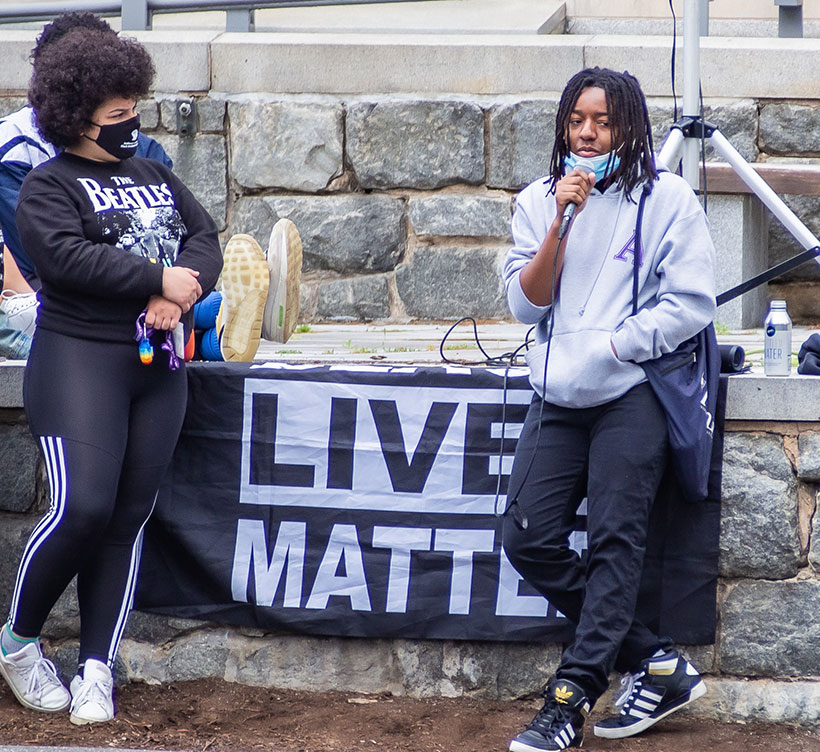
Two hundred Amherst students gathered outside Frost Library on April 13 to demand institutional change, “stand in community and solidarity” with Black classmates and acknowledge the importance of Black students’ mental health.
Organized by Amherst’s Black Student Union (BSU), the #BlackMindsMatter Walkout began at 10 a.m. and was supported by the Association of Amherst Students (AAS). In an email to some staff and faculty, the AAS joined the BSU in calling for the College to reform its policies concerning extensions and class absences, double the staff of the Counseling Center and abolish the Amherst College Police Department (ACPD). The demonstration, which was presided over by BSU President Ayodele Lewis ’21, included a public presentation of those demands. (See President Martin’s message outlining the process and timing for a response to the issues raised.)
Lewis began the event by discussing the fatal police shooting of 20-year-old Daunte Wright in Minnesota on Sunday.
Wright’s death, and the other police killings of Black people nationwide, reverberate far beyond the family and friends of the victims, Lewis said: They have a profound emotional impact on all members of the Black community, Amherst students included. Yet, she said, those affected are expected to carry on at the College as if a traumatic event has not just occurred.
At the walkout, Lewis “invoked the spirits” of Black lives lost by reading the names of some of those killed. As she did so, she and her fellow BSU members practiced the ritual of pouring out libations (in this case, water) in memory of the dead. Some of the names she listed are immediately recognizable: George Floyd, Daunte Wright, Breonna Taylor, Ahmaud Arbery, Trayvon Martin, Michael Brown.
But another person she named was Gerald Penny, a Black member of Amherst’s class of 1977, who died during a required swimming test at the start of his first year in college. Lewis, in telling Penny’s story, explained that, at that time, a disproportionate number of African Americans relative to the white population did not know how to swim (a fact that is still true today, according to Swimming World magazine). Penny was among them, and he drowned in the College pool. After she explained how Penny died, Lewis called on participants to repeat his name after she did. Together, Lewis and the crowd did so: Gerald Penny, Gerald Penny, Gerald Penny, Gerald Penny.
The organizers encouraged those in attendance to share their own stories. Some students who took the stage spoke of frightening encounters with law enforcement, experiences with racism and bigotry at home and on campus and feelings of “survivor’s guilt” when thinking of Black people killed by police in this country.

Lewis also led the crowd in laying down on the ground for six minutes of silence in memory of murdered Black people whose bodies were left unattended by authorities for long periods of time.
“The news of yet another police killing of a young, unarmed Black man, Daunte Wright, adds yet more stress, anxiety and fatigue to what our students, faculty, and staff of color already feel in the wake of too many such incidents,” said President Biddy Martin in some comments provided to The Amherst Student newspaper. “Black students acted on their need to pause, to take stock, and rest from the barrage. They challenged the community to place a higher priority on mental health and well being and they gathered in solidarity with one another. Many of those who spoke called on their peers, on the college as a whole, and, at times, on one another, to confront racism and other forms of prejudice and discrimination in order to create more change.”
She added: “The college will continue to work hard on the commitments outlined in the anti-racism plan and in two quarterly updates, placing particular emphasis on mental health and well being and changes to the ACPD. Both of these critical pieces of work require more study and more dialogue before final decisions can be made.”
After the BSU members sang two songs, Lewis concluded the walkout by urging the crowd to attend to their own mental health and well being and to “hold space for joy, liberation and rest.”
“We are here,” she said, reminding all of the community that Black students have created on campus. “We will always be here.”